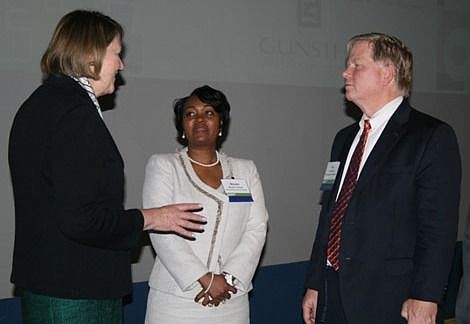
It may sound like a stretch, but it isn’t: Baptist Health’s new lifesaving treatments for patients having a stroke is directly impacting the Jacksonville real estate market.
That’s because 10 of the 11 physicians who comprise Baptist’s stroke and cerebrovascular team relocated to the Jacksonville area from other communities, says Nicole Thomas, senior vice president of specialty services for Baptist Health.
The neurologists’ use of teleneurology innovation is enabling emergency room physicians to have round-the-clock access to the specially trained physicians in real-time, two-way audio and video communication to provide immediate access and lifesaving care to stroke patients.
The technology means patients from Bainbridge, Ga., to St. Augustine don’t have to leave the area to receive treatment.
“We are using neurologists at Baptist to improve patient care, but we’re also using it to attract top talent to Jacksonville,” Thomas said, noting the team physicians’ average age is 37.
“So you start to make the connection as to how that impacts real estate, how that impacts the economy,” she said.
Thomas was among four panelists providing insight on the correlation between real estate, innovation and the local job market Tuesday at the Urban Land Institute’s annual Emerging Trends in Real Estate forum.
The Washington, D.C.-based institute says growing, innovative hospitals are natural economic boosters for communities as space near hospital centers command a premium, meaning landlords shouldn’t have difficulty leasing space near medical campuses.
The keynote speaker for Tuesday’s forum at WJCT Studios was Kathleen Carey, chief content officer for the Urban Land Institute, which along with PwC tax and advisory service publishes the annual Emerging Trends in Real Estate report.
The 2016 Emerging Trends report gives Jacksonville a green dot on its map for real estate prospects, a notch above the city’s yellow “fair” dots in 2014 and 2015.
“According to ‘Emerging Trends,’ you ought to have a very positive and very strong next 12 months,” Carey told the audience.
The idea for Tuesday’s event was to discuss ways Jacksonville can become a cutting-edge city that competes with top metropolitan communities in the Southeast and beyond.
Along that line, panelist Gary Chartrand discussed the opportunities the community is embracing through the 8-month-old STEM2 Hub workforce and educational program in the fields of science, technology, engineering, math and medicine.
The not-for-profit co-founded by Chartrand aims to benefit the Northeast Florida economy by encouraging schools and employers to establish programs and partnerships to develop talent in those fields.
“It is business-led so we could clearly articulate to the education community where the gaps are, where the demand is and how the educational community can actually react,” said Chartrand, a state Board of Education member and executive chairman of Acosta Sales and Marketing in Jacksonville.
In addition to promoting early college opportunities, the organization has partnered with Code.org to add computer coding to elementary school curriculums beginning in fall 2016 in Duval, Baker, Clay, Flagler, Nassau, Putnam and St. Johns counties.
The United Kingdom recently began requiring public schools to teach coding and Chartrand said the Florida Legislature is considering a similar measure.
“Most of the people I’ve bumped into who are coders taught themselves how to code,” he said. “It will only be a half-an-hour of coding, but it will expose our children to it.”